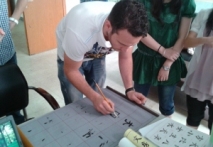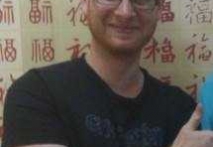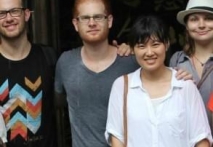Latest News
- Wuxi's Nanchang Street--a historic cultural district that combines classical charm, delicious food, and fun activities
- chinese study
- lastest courses
- Business Assistance/International Consortium of Stem Cell Research
- Foreigner's view of Jiangsu -Changzhou Jintan starts
- estimonials for Our new French Internship student Anais 企业表扬信
- The Double Seventh Festival in China Introduction
- Chinese Proficiency Test (HSK)
- China University Mining and Technology
- Wuxi Library
Students Say
Mandarin Student Zack
Mandarin Education School is a great place to learn Chinese and Chinese Culture.I've learned a lot in this school, my Chine...
Learn Chinese Travel China
If you want to learn Chinese and also discover China, Mandarin Education organize the most funny and cultural study tour.
The...
suzhou Mandarin Jude
I am Jude, I am learning Mandarin in Suzhou Mandarin School,I was learning in Wuxi Mandarin Education too.I like my Chinse Teacher...
chinese class
Improve your reading, speaking and your writing by experiencing our teaching methods,Offer free student Visa.
...
Wuxi Mandarin Jessie
I've learned Chinese for almost 8 years, I can understand what Chinese people say,but when I speak, I feel very uncomfor...
Chinese Internship or Jobs
You are looking for a professional experience abroad? Get the opportunity to discover the Chinese business,Look for an ...
Mandarinedu Student Florent
I love my Wuxi Mandarin Education School. It is the EASY MANDARIN Learning way, I am learning faster than I wanted.My teach...
Mandarin E Learning
Mandarin Education School offers you Online Chinese Courses. It has never been so easier to have Chinese courses ...
Mandarin Student Brad
I am studying Chinese in Mandarin Education School. I can speak quit good Chinese and talk to Chinese people by myself. Thank...
Wuxi Mandarin edu. Student Jennifer
I love learning Chinese in Mandarin Education School.That's a great place to learn and make friends.
...
Add Our School Official
to get more informations

0086 1866 1199 988
0086 510-81151808
Sandy.Swun
519988808
Mandarin Education School
Room 405, 4 Fl,Building No.8,
Maoye Business Center,
Chang jiang No.1,
New district , Wuxi City , China
1. 了表示变化“了”
语气助词了用在陈述句句尾,表示情况有了变化,或出现了新的情况,如“我现在没钱了,”表示“我”以前有钱,现在没有钱的变化。例如:
(1)上个月很冷,现在天气不那么冷了。
(2)我前几天有点儿发烧,现在好多了。
(3)我现在更喜欢夏天了。
(4)这条裙子是去年买的,今年不能穿了。
2. 越来越+形容词/心理动词
“越来越”的后边加上形容词或心理动词,如“越来越冷”“越来越喜欢”表示随着时间的推移程度上发生的变化。注意,形容词或心理动词的前边都不能再加程度副词,不能说“越来越非常热”“越来越非常想。”例如:
1. 我认识的汉字越来越多。
2. 你越来越漂亮。
3. 我越来越喜欢运动。
4. 我做的饭越来越好吃。
1.Indicating a change
Used at the end of a declarative sentence, the modal particle “le”indicates a change in the situation or the occurrence of a new situation.for example, I have no money means I used to have money,but now I don’t,implying a change.For example:
(1) It was very cold last month, but it's not so cold now.
(2) I had a fever the other day, and I'm much better now.
(3) I prefer summer now.
(4) This skirt was bought last year and cannot be worn this year.
2.Followed by an adjective or a mental verb as in (colder and colder)and (like...more and more) ‘more and more’ indicates the change in degree occurs as time passes by Note that adjectives or psychological verbs can not be added to the front of degree adverbs, can not say "more and more very hot" and "more and more very want to."
For example:
1. I know more and more Chinese characters.
2. You are becoming more and more beautiful.
3. I like sports more and more.
4. My cooking is getting better and better.
1. “了”는 변화를 표시하다
어투조사“了”는 진술문의 마지막에 사용되여 상황이 변했거나 새로운 상황이 나타났음을 표시하다.예를들면“我现在没钱了나는 지금 돈이 없다”,이전에 돈이 있었으니,지금은 돈을 없다는 변화을 표시하다.예를들면:
1) 지난달은 아주 추웠는데 지금은 날씨가 그다지 춥지 않습니다.
2) 나는 며칠 전에 열이 좀 났었는데,지금은 많이 좋아졌다.
3) 나는 지금 여름을 더욱 좋아한다.
4) 이 치마는 작년 여름에 산 건데 올해는 입을 수 못한다.
2. 越来越갈수록+형용사/심리 동사
“越来越갈수록”의 뒤에 형용사나 심리동사를 붙이고 예를들면“越来越冷갈수록/점점 춥다”“越来越喜欢갈수록/점점 좋아하다”시가의 흐름에 따라 정도상 발생한 변화를 표시하다.주의,형용사나 심리동사의 앞부분에 더 이상 정도부사를 붙일수 못한다.“越来越非常热”“越来越非常想”말할 수 없다.예를들면:
1. 내가 아는 한자가 갈수록 많아진다.
2. 너는 점점 예뻐지네요.
3. 나는 갈수록 운동을 좋아한다.
4. 내가 한 밥이 갈수록 맛있다.










